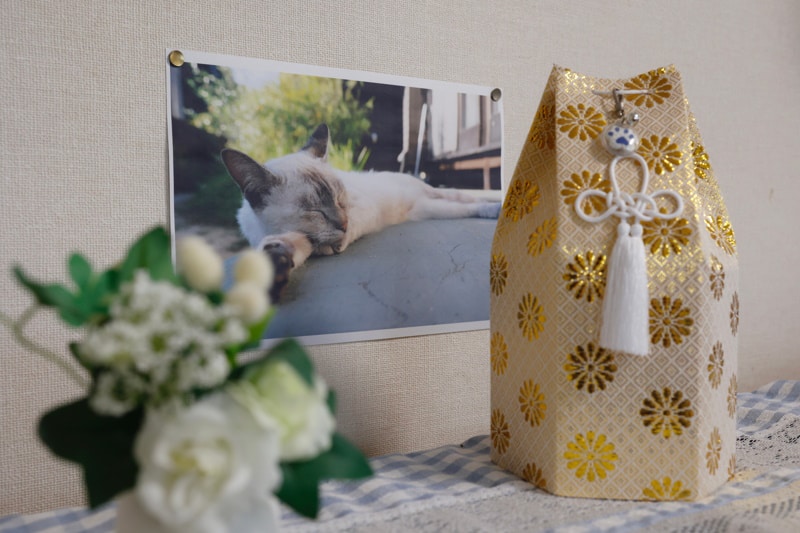Do Cats Learn From Their Mistakes? Feline Behavior Explained
Updated on
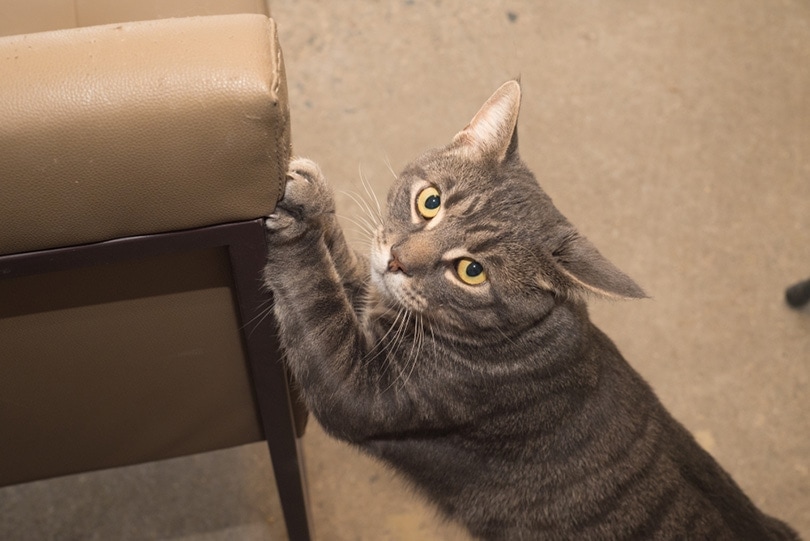
If you know anything about cats, you know that they are famous for their independence and for acting seemingly without care of consequences. This can be true for many cats, but it ultimately depends on the cat. All cats, just like dogs and people, have unique personalities — some cats are needy, while others want to be mostly left alone.
But do cats actually learn from their mistakes? The short answer is sort of. Cats are intelligent enough to be trained to a certain degree (depending on the cat), but they don’t really know when they’ve done something wrong (in our eyes).
That said, here are a few measures that you can take to stop negative behaviors, as well as the right and wrong ways to discipline a cat.
Do Cats Know When They Do Something Wrong?
Cats don’t really understand what we perceive as good or bad behavior. Part of what makes cats so different from dogs in this manner is their origins. Essentially, cats domesticated themselves, about 8,000 years ago.
These ancestors of current domesticated cats entered a mutually beneficial relationship with humans by eradicating the pests in food storage areas. It’s thought that humans did not intend to domesticate cats — it just sort of happened.
In comparison, dogs were brought into human settlements with the sole intention of putting them to work. Dogs now tend to look to their owners for help, or if they hear their owners’ angry voices when they’ve done something wrong, their instincts are to appease them, so dogs do learn from their mistakes to a certain degree.
However, since cats are so independent, as much as they love us, they don’t have that same desire to please us. They will understand that you’re angry but not the reason.
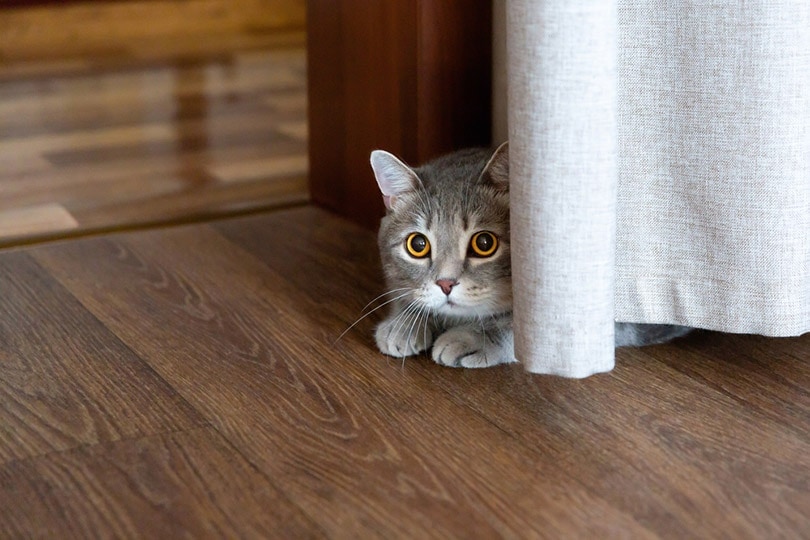
What If It Feels Like Your Cat Is Holding a Grudge?
Sometimes, it feels like cats hold grudges and do naughty things on purpose. First, many things that cats do that might seem like they are being destructive are actually just normal cat behavior.
You should always try to understand a cat’s behavior, which is more effective when dealing with behavioral problems. Experts say that you shouldn’t be training your cat for tricks, but rather your focus should be on making your cat happier, which will only improve your relationship.
When cats become stressed and anxious, this can lead to destructive behaviors like aggression, scratching, and eliminating outside of the litter box. Cats are creatures of habit and don’t like change. Small changes might result in minor issues, and more significant changes can lead to destructive behavior.
So, instead of getting angry at your cat for pooping in your shoes, consider that your cat is stressed, and this is how they express it.
What Methods Should I Use to Train My Cat?
How you teach or train your cat is similar to how you train dogs: with positive reinforcement. Punishing a cat for knocking a glass off the counter will only confuse them and make them afraid of you.
Every time you react to your cat doing something unwanted, like scratching your favorite chair, this teaches your cat that scratching that chair will gain your attention. This will only ensure that your chair will continue to get scratched up when they are seeking attention.
Your best bet is to reward your cat with pets, treats, or praise when they are clawing the scratching post. If your cat starts to go after your chair, you should ignore them (if you can) or redirect them and then reward your cat when they start scratching in the right place.
You can also consider using deterrents, such as furniture sprays, furniture guards, or double-sided sticky tape. Use these ideas in any areas where your cat is scratching and shouldn’t be.
If your cat constantly jumps on a shelf that contains your prized ceramic unicorn collection, remove the unicorns and put them in a cat-safe place. No matter how many times you yell “no!” at your cat, they will just keep on doing it.
You should also ensure that your cat has enough entertainment, such as cat trees and/or shelves, toys, and your attention for playtime. The more bored your cat is, the more likely they will get into mischief.
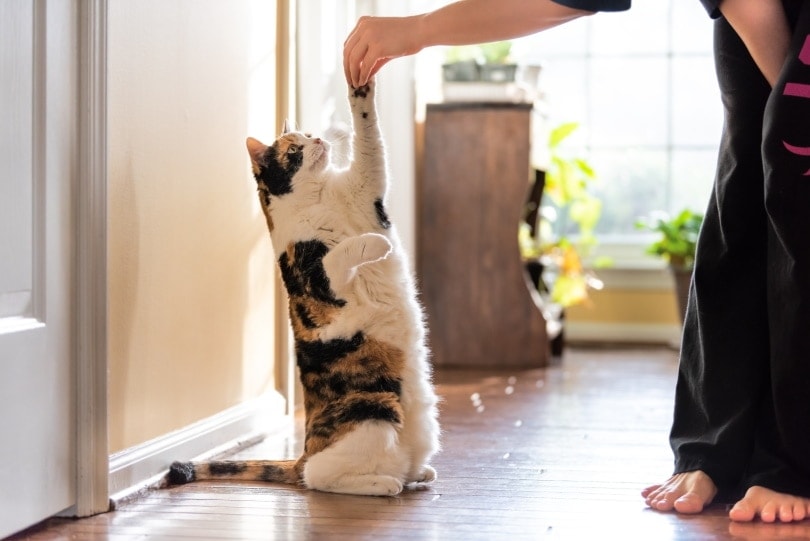
Training Cats Is Done in Small Steps
Any cat training needs to be done in small steps and only for short periods of time. This also means you need to be patient.
For example, start by calling your cat to come to you using a treat as an enticement. Stand several feet away from your cat, hold out a treat, call your cat’s name to gain their attention, and say, “Come,” or any word of your choice. You can pull the treat toward your body to bring your cat closer to you and then reward them with the treat.
Keep repeating these steps at different times (remember, you should only train your cat for a few minutes at a time), and eventually, try it farther away from your cat.
You can use the same concept for everything from preventing scratching to tolerating nail trimming (like rewarding your cat by starting with touching their paws and building from there).
Keep in mind that the treat should be something special — your cat should really want this treat in order to keep them motivated.
Catify Your Home
The more negative behavior that your cat presents, the more likely that your cat is bored. Cats love exploring and hanging out in high places, so you should have at least one cat tree. Even better would be to place a series of ramps and shelves along the walls so your cat can navigate the room from up high.
If your cat is doing something that they shouldn’t be, grab a feather toy (or whatever your cat loves to play with) and wave it to gain your cat’s attention. They will forget all about knocking your ornaments to the ground and will happily play with you until they’re done. Keeping your cat tired through play and activity will ensure more naps and less mischief.
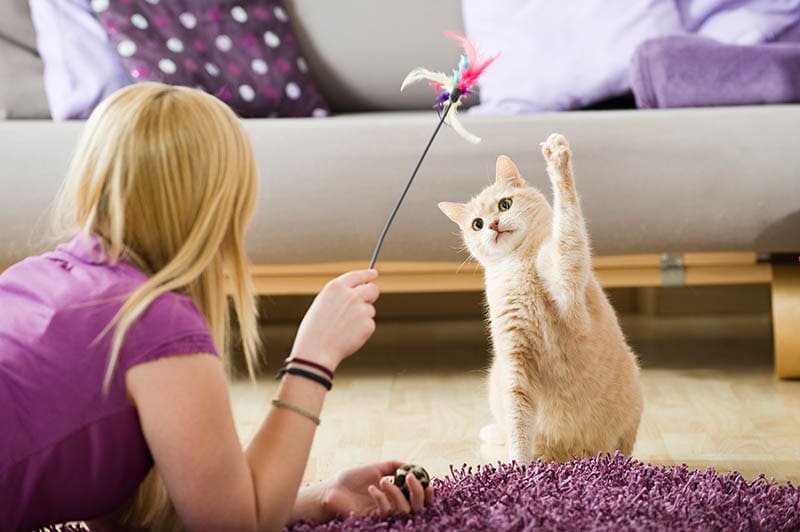
In Conclusion
While cats don’t know that what they are doing is wrong, they certainly know when you’re not happy about it. Punishment is never the answer; this only teaches the cat to fear you and they will only hide or show aggression when you’re around.
Try to reward your cat when they do something that you might take for granted, like sharpening their claws on the scratching post. When they start to do something that you don’t want them to do, redirect them. Place them near the scratching post or on their cat tree. When they do the “good behavior,” reward them.
Don’t give up if nothing seems to work. Talk to your vet, and investigate getting an animal behaviorist involved. Strengthening your bond with your cat should be one of your top priorities.
Featured Image Credit: Melissa Sue, Shutterstock

